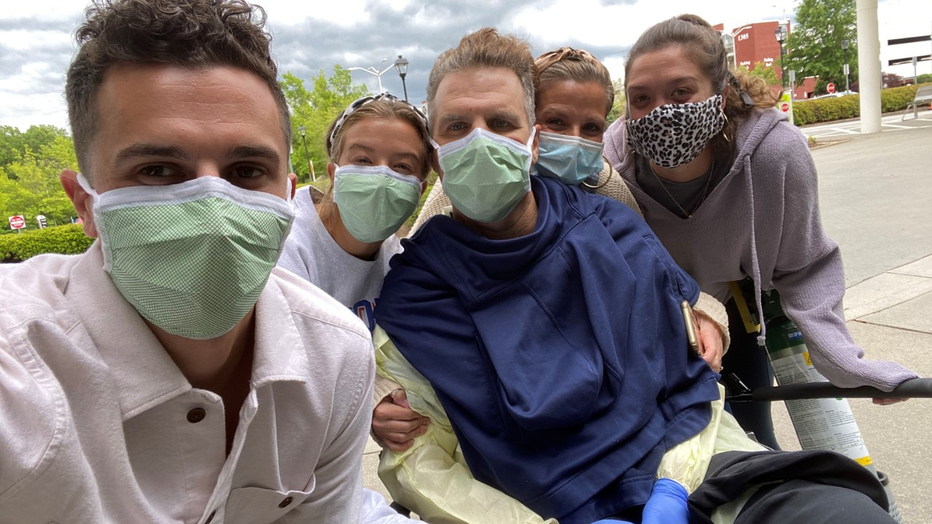FDA puts the brakes on widening access to COVID-19 plasma treatments, at least for now
FDA delays blood plasma as COVID-19 treatment
A study showed the treatment is promising, but the FDA wants more information about blood plasma's effectiveness.
ATLANTA - The Food and Drug Administration has reportedly put the brakes on a plan to grant emergency use authorization to convalescent plasma, a promising, but still largely unproven, coronavirus treatment, according to a report in the New York Times.
Hospitalized coronavirus patients can still receive plasma infusions, but they must do so through a clinical trial.
The agency has reportedly decided not to fast-track widening the availability of the plasma treatments until more data is available.
COVID-19 survivor Stuart Hall believes the plasma donations he received were a gamechanger.
"It saved my life," Hall says. "That's not my opinion, that's the opinion of the doctors who saved my life."
The 52-year-old Buford, Georgia, father of 3 suffered a COVID-19 related heart attack that landed him on a ventilator in Northside Forsyth's ICU for 21 days.

Stuart Hall, a Buford, Georgia, coronavirus survivor, with his wife Kellee and children outside Northside Forsyth Hospital, where he spent 21 days on a ventilator. (Stuart Hall)
In a last-ditch effort to save him, Hall says, doctors gave him two infusions of donated plasma.
"Three or four days later after 2 plasma exchanges, I'm a completely different person, and by that Friday, they're taking me off the ventilator."
Sign up for FOX 5 email alerts
Stories like Hall's show the potential of convalescent plasma, which has been used for more than 100 years.
In this case, people who fight off a coronavirus infection produce protective antibodies in their blood plasma that they are donating to help patients currently hospitalized with the virus.
According to the website USCovidPlasma.org, as of August 20, 2020, nearly 100,000 coronavirus survivors have donated plasma, and almost 70,000 coronavirus patients have received infusions.
A recent Mayo Clinic study of 35,000 COVID-19 patients found convalescent plasma, when given quickly, lowered death rates in critically-ill patients.
But the FDA reportedly wants more data about the treatment's efficacy.
"I wasn't surprised that the FDA balked," says Dr. Kent Holland, the medical director of Atlanta Blood Services at Northside Hospital.
Dr. Holland has been a part of the Mayo-led research project, helping to collect plasma from 600 to 700 donors since April.
Harvard expert shares why thinking about morality rates mid-pandemic is ‘distracting’
Harvard expert shares why thinking about morality rates mid-pandemic is 'distracting'
With the virus sickening hundreds of thousands of Americans, Holland says the goal of the research was to get the treatment out to as many patients as possible, not to assess its effectiveness.
"The FDA has a very high bar, and it's called a randomized trial," Holland says. "We can that 'the gold standard,' where you compare the patients who either get the plasma or who don't get the plasma. They, say, get saline, which is a placebo. That's not how this trial was designed. It was never meant to do that."
Holland says there is evidence being exposed to a virus like the novel coronavirus can produce passive immunity, or a level of protection, at least for time, against re-infection.
"What what we don't know is, 'Will this type of antibody we produce protect the next person,'" Holland says. "We just don't know the answer to that with COVID."
Download the FOX 5 Atlanta app for breaking news and weather alerts.
Stuart Hall says the focus right now is where it should be, on saving lives.
"I, personally, think that the medical community has their head down and is working so hard in it, that they haven't had time to work on it," he says.
Yet, Hall believes the potential of convalescent plasma is huge.
"There are going to be more situations like mine, where that plasma exchange is going to save someone's life," he says.
RELATED: CoronavirusNOW.com, FOX launches national hub for COVID-19 news and updates.
Know how the COVID-19 outbreak is impacting Georgia
-----

